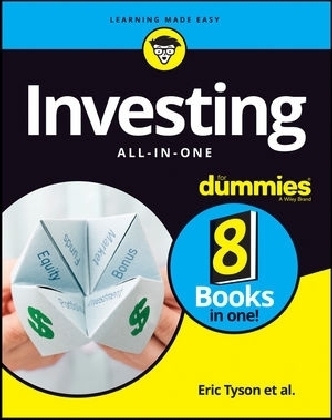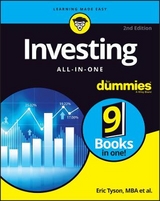
Investing All–in–One For Dummies
John Wiley & Sons Inc (Verlag)
978-1-119-37662-0 (ISBN)
Invest in your financial future Featuring guidance from renowned finance expert Eric Tyson and content from other top selling For Dummies investment titles, Investing All-in-One For Dummies offers the foolproof, time-tested guidance you need to turn those hard-earned dollars into a successful and diversified portfolio. Covering everything from stocks, bonds, mutual funds, real estate, and the latest in online investing, this hands-on resource lays out an arsenal of techniques for you to select the investment accounts that best suit your particular style, needs, and goals. Investing All-in-One For Dummies offers a succinct framework and expert advice to help readers make solid decisions and confidently invest in the marketplace * Develop and manage a winning financial portfolio * Find the right investments for you, no matter your age or income bracket * Get the latest information on retirement planning, tax laws, investment options, and more * Benefit from sound strategies brought to you by a well-recognized personal finance counselor There's no time like the present to invest in your own financial future and this book shows you how.
Eric Tyson is a best-selling personal finance book author and has penned five national best sellers. He is also the only author to have four of his books simultaneously on Business Week's business book bestseller list. His Personal Finance for Dummies, a Wall Street Journal best-seller, won the Benjamin Franklin Award for Best Business Book of the Year. Eric's syndicated newspaper column is read by millions of readers weekly. He is a former columnist and award-winning journalist for the Sunday San Francisco Chronicle.
Introduction 1
About This Book 1
Foolish Assumptions 2
Icons Used in This Book 3
Beyond the Book 3
Where to Go from Here 4
Book 1: Getting Started with Investing 5
Chapter 1: Exploring Your Investment Choices 7
Getting Started with Investing 8
Building Wealth with Ownership Investments 8
Generating Income from Lending Investments 11
Considering Cash Equivalents 13
Where to Invest and Get Advice 14
Chapter 2: Weighing Risks and Returns 17
Evaluating Risks 18
Analyzing Returns 28
Compounding Your Returns 35
Chapter 3: The Workings of Stock and Bond Markets 39
How Companies Raise Money through the Financial Markets 39
Understanding Financial Markets and Economics 42
Book 2: Investing in Your 20s and 30s 51
Chapter 1: Using Investments to Accomplish Your Goals 53
Setting and Prioritizing Your Shorter-Term Goals 53
Investing in Retirement Accounts 56
Chapter 2: Minimizing Your Taxes When Investing 63
Understanding Investment Taxes 63
Reducing Your Taxes When Selling Investments 66
Chapter 3: Laying Out Your Financial Plans 71
First Priorities: Paying Off High-Cost Debt and Building a Safety Reserve 72
What about Paying Down Other Debts? 73
Sorting Out Your Financial Plans 76
Knowing the Impact of Investing for College Costs 79
Securing Proper Insurance 83
Chapter 4: Starting Out with Bank Accounts and Money Market Funds 85
Understanding FDIC Bank Insurance 86
Investing in Banking Account and Savings Vehicles 86
Feeling Secure with Your Bank 89
Defining Money Market Mutual Funds 91
Understanding Money Market Fund Holdings 93
Protecting and Accessing Your Money in Money Funds 94
Using Money Market Funds in Your Investment Plan 95
Understanding Traits of Leading Money Funds 96
Book 3: Starting with Stock Investing 99
Chapter 1: Gathering Information on Stocks 101
Looking to Stock Exchanges for Answers 102
Grasping the Basics of Accounting and Economics 103
Staying on Top of Financial News 108
Reading (And Understanding) Stock Tables 110
Using News about Dividends 115
Evaluating Investment Tips 117
Chapter 2: Investing for Long-Term Growth 119
Becoming a Value-Oriented Growth Investor 120
Choosing Growth Stocks with a Few Handy Tips 121
Chapter 3: Investing for Income: Dividend-Paying Stocks 129
Understanding the Basics of Income Stocks 130
Analyzing Income Stocks 134
Exploring Some Typical Income Stocks 138
Chapter 4: Using Basic Accounting to Choose Winning Stocks 143
Recognizing Value When You See It 144
Accounting for Value 147
Book 4: Looking at Bond Investing 161
Chapter 1: Bond Fundamentals 163
Understanding What Makes a Bond a Bond 164
Why Hold Bonds? 167
Introducing the Major Players in the Bond Market 169
Buying Solo or Buying in Bulk 170
The Triumphs and Failures of Fixed-Income Investing 172
Realizing How Crucial Bonds Are Today 176
Viewing Recent Developments, Largely for the Better 177
Chapter 2: All about the Interest 179
The Tricky Business That Is Calculating Rates of Return 180
Measuring the Desirability of a Bond 182
Understanding Yield 188
Recognizing Total Return (This Is What Matters Most!) 191
Measuring the Volatility of Your Bond Holdings 194
Returning to the Bonds of Babylonia 196
Chapter 3: Types of Bonds 197
Exploring the Many Ways of Investing with Uncle Sam 197
Industrial Returns: Corporate Bonds 201
Lots of Protection, a Touch of Confusion: Agency Bonds 205
Banking Your Money on Other People’s Mortgages 208
(Almost) Tax-Free Havens: Municipal Bonds 209
Chapter 4: Investing (Carefully!) in Individual Bonds 213
Navigating Today’s Individual Bond Market 213
Dealing with Brokers and Other Financial Professionals 215
Doing It Yourself Online 219
Perfecting the Art of Laddering 222
Chapter 5: Picking a Bond Fund That Will Serve You for Life 225
Defining the Basic Kinds of Funds 226
What Matters Most in Choosing a Bond Fund of Any Sort 230
Book 5: Moving on to Mutual Funds 233
Chapter 1: Considering Mutual Funds’ Pros and Cons 235
Introducing Mutual Funds and Exchange-Traded Funds 236
Getting a Grip on Funds 236
Opting for Mutual Funds 240
Addressing the Drawbacks 248
Understanding Exchange-Traded Funds 250
Chapter 2: Finding the Best Funds 255
Evaluating Gain-Eating Costs 255
Weighing Performance and Risk 263
Recognizing Manager Expertise 269
Chapter 3: Buying Funds from the Best Firms 271
Finding the Best Buys 271
Discount Brokers: Mutual Fund Supermarkets 277
Places to Pass By 281
Book 6: Investing Online 283
Chapter 1: Getting Ready for Online Investing 285
Why Investing Online Is Worth Your While 286
Getting Started 286
Gut-Check Time: How Much Downside Risk Can You Tolerate? 289
Passive or Active? Deciding What Kind of Investor You Plan to Be 290
Chapter 2: Getting Your Device Ready for Online Investing 293
Turning Your Device into a Trading Station 294
Tracking the Market’s Every Move 297
Monitoring Market-Moving News 302
Checking In on Wall Street Chatter 306
Keeping Tabs on the Regulators 310
Executing Trades 312
Searching the Internet High and Low 313
Keeping the Bad Guys Out: Securing Your PC 313
Mastering the Basics with Online Tutorials and Simulations 315
Chapter 3: Connecting with an Online Broker 319
Finding the Best Broker for You 320
Separating the Types of Brokerages 322
Avoiding Hidden Fees 332
Finding Out What Reviewers Think 334
Is Your Money Safe? Checking Out Your Broker 335
Cutting the Cord: Mobile Trading 336
Pay Attention to Where Your Cash Is Parked: Money Market Funds 338
Buying Stocks and Mutual Funds without a Broker 338
Opening and Setting Up Your Account 341
Chapter 4: Entering and Executing Trades 343
Understanding How Stock Trades and Shares Are Handled 344
Getting It Done: Executing Your Trades 348
Book 7: Introducing Fundamental Analysis 353
Chapter 1: Understanding Fundamental Analysis 355
Why Bother with Fundamental Analysis? 356
Knowing the Tools of the Fundamental Analysis Trade 361
Making Fundamental Analysis Work for You 363
Chapter 2: Getting Up to Speed with Fundamental Analysis 365
What Is Fundamental Analysis? 366
Comparing Fundamental Analysis with Other Ways of Picking Investments 372
Putting Fundamental Analysis to Work for You 374
Making Money with Fundamental Analysis 377
The Fundamental Analysis Toolbox 378
Chapter 3: Gaining an Edge with Fundamental Analysis 383
Better Investing with Fundamentals 384
Relying on the Basic Info the Pros Use 390
Figuring Out When to Buy or Sell a Stock 394
Chapter 4: Getting Your Hands on Fundamental Data 401
Getting In Sync with the Fundamental Calendar 402
Getting up to Speed with the Basic Accounting and Math 410
How to Get the Fundamental Data You Need 414
Book 8: Investing in Real Estate 421
Chapter 1: Evaluating Real Estate as an Investment 423
Understanding Real Estate’s Income- and Wealth-Producing Potential 424
Recognizing the Caveats of Real Estate Investing 426
Comparing Real Estate to Other Investments 427
Determining Whether You Should Invest in Real Estate 432
Fitting Real Estate into Your Plans 434
Chapter 2: Covering Common Real Estate Investments 439
Identifying the Various Ways to Invest in Residential Income Property 439
Surveying the Types of Residential Properties You Can Buy 447
Considering Commercial Real Estate 452
Buying Undeveloped Land 453
Chapter 3: Identifying Sources of Capital 457
Calculating the Costs of Admission 458
Rounding Up the Required Cash by Saving 460
Overcoming Down Payment Limitations 460
Chapter 4: Location, Location, Value 465
Deciding Where to Invest 466
Finding Properties to Add Value 467
Evaluating a Region: The Big Picture 469
Investigating Your Local Market 472
Evaluating Neighborhoods 485
Mastering Seller’s and Buyer’s Markets 490
Index 493
| Erscheinungsdatum | 25.05.2017 |
|---|---|
| Verlagsort | New York |
| Sprache | englisch |
| Maße | 189 x 242 mm |
| Gewicht | 720 g |
| Themenwelt | Sachbuch/Ratgeber ► Beruf / Finanzen / Recht / Wirtschaft ► Geld / Bank / Börse |
| Wirtschaft ► Betriebswirtschaft / Management ► Finanzierung | |
| ISBN-10 | 1-119-37662-9 / 1119376629 |
| ISBN-13 | 978-1-119-37662-0 / 9781119376620 |
| Zustand | Neuware |
| Informationen gemäß Produktsicherheitsverordnung (GPSR) | |
| Haben Sie eine Frage zum Produkt? |
aus dem Bereich



